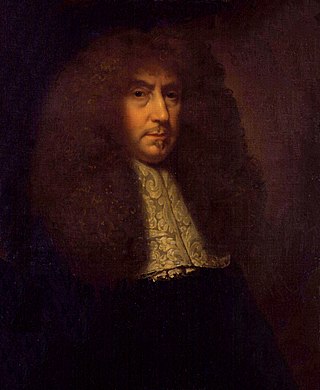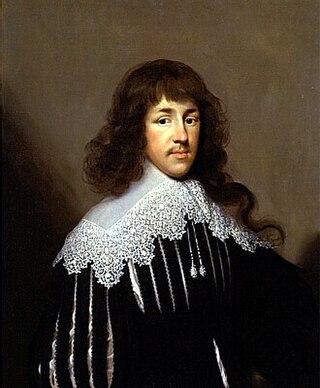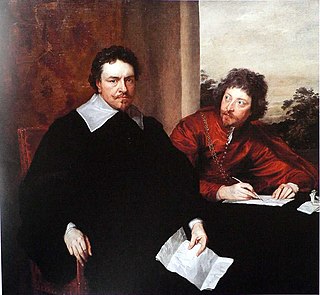Related Research Articles

Sir Robert Long, 1st Baronet of Westminster was an English courtier and administrator who sat in the House of Commons at various times between 1626 and 1673.
Thomas Wentworth, 5th Baron Wentworth, KB, PC was an English landowner and soldier who supported the Royalists during the Wars of the Three Kingdoms. At the end of the First English Civil War in 1646, he accompanied the future Charles II of England into exile and fought with him at the Battle of Worcester in 1651.
Henry Grey, 10th Earl of Kent, known as Lord Ruthin from 1639 to 1643, was an English politician who sat in the House of Commons in 1640 and succeeded to the title Earl of Kent in 1643.

Richard Vaughan, 2nd Earl of Carbery KB, PC, styled The Honourable from 1621 to 1628 and then Lord Vaughan until 1634, was a Welsh soldier, peer and politician.
Francis Leigh, 1st Earl of Chichester was a Royalist politician and courtier around the period of the English Civil War.
Sir Henry Vaughan the elder was a Welsh politician who sat in the House of Commons variously between 1621 and 1644. He was a Royalist leader during the English Civil War.

Sir Francis Godolphin MP, of Godolphin in Cornwall, was an English nobleman, landowner, politician, and Member of Parliament. His chief claim to fame is that he was the dedicatee of Hobbes' Leviathan.
Sir Richard Vyvyan, 1st Baronet was an English politician who sat in the House of Commons at various times between 1640 and 1665. He supported the Royalist cause in the English Civil War.

Thomas Fanshawe, 1st Viscount Fanshawe KB was an English politician who sat in the House of Commons at various times between 1621 and 1661. He supported the Royalist cause in the English Civil War. Following the Restoration he was raised to the peerage.
Edward Montagu, 2nd Baron Montagu of Boughton of Boughton House, Northamptonshire was an English peer and politician.
Piers Edgecumbe was an English politician who sat in the House of Commons between 1640 and 1644 and between 1662 and 1667. He supported the Royalist side in the English Civil War.

Sir Philip Mainwaring was an English politician who sat in the House of Commons variously between 1625 and 1661.

Sir Thomas Peyton, 2nd Baronet, 18 August 1613 to 11 February 1684, was a member of the landed gentry from Knowlton Court in Kent. He supported the Royalists in the War of the Three Kingdoms, and took part in a number of conspiracies to restore Charles II of England during the 1649 to 1660 Commonwealth period.
Sir Hugh Owen, 1st Baronet was a Welsh politician who sat in the House of Commons variously between 1626 and 1660. He sided originally with the Parliamentarian side in the English Civil War, but the strength of his allegiance was in doubt.
John Bodvel was a Welsh politician who sat in the House of Commons of England from 1640 to 1644. He was a colonel in the Royalist army in the English Civil War.
Sir George Wentworth was an English politician who sat in the House of Commons from 1640 to 1644. He fought for the Royalist army in the English Civil War.
William Carnaby (1595–1645) was an English politician who sat in the House of Commons in 1640. He fought on the Royalist side in the English Civil War.
Peter Venables of Kinderton, Cheshire, was an English politician who sat in the House of Commons at various times between 1640 and 1669. He supported the Royalist cause in the English Civil War.
Walter Lloyd (1580–1661) was a Welsh politician who sat in the House of Commons from 1640 to 1644. He supported the Royalist cause in the English Civil War.

John Fettiplace (1583–1658) was an English politician who sat in the House of Commons at various times between 1626 and 1644. He supported the Royalist cause in the English Civil War.